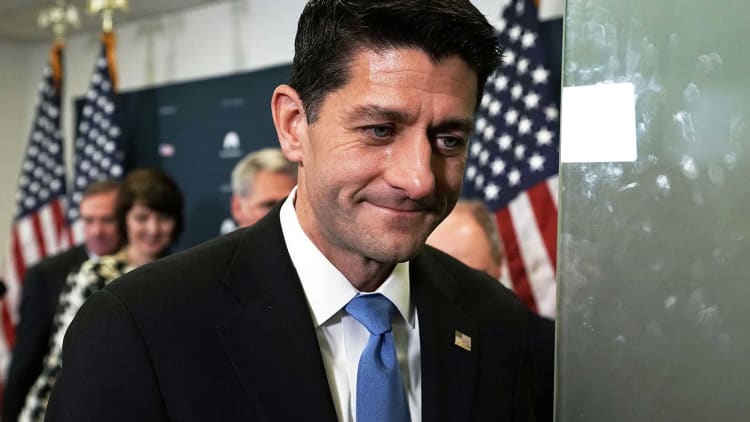
House Republicans approved sweeping changes to the U.S. tax code Tuesday, but they will have to vote again on a final bill Wednesday morning after the legislation hit a procedural snag in the Senate late Tuesday afternoon.
Republican lawmakers had been barreling toward their goal of passing the first major tax overhaul in decades before the end of the year. But in their haste, they appeared to have violated a Senate procedural measure known as the Byrd rule.
A Senate aide confirmed to CNBC that three provisions in the bill adopted by the House on Tuesday do not comply with Byrd rule requirements. The rule governs what types of provisions the Senate may consider under the procedural budget window known as reconciliation.
One of these provisions would allow 529 college savings plans to be used for home-schooling expenses. Another is related to a tax exemption for a very narrow category of colleges. The third appears to relate to the bill's name, the "Tax Cuts and Jobs Act."
The Senate is still expected to vote to pass a revised version of the tax bill Tuesday night, and send the final legislation back to the House for a procedural vote Wednesday morning.
Earlier Tuesday, the GOP tax plan passed the House by a margin of 227-203, and Republicans erupted in cheers when the bill garnered enough support. Twelve Republicans — all from high-tax states that traditionally lean Democratic — bucked their party's leadership and opposed the bill. As House members voted on the legislation, chants of "shame!" came down from protesters in the chamber's gallery.
Once the House votes again to pass the tax bill, it will send the broadly unpopular measure to the Senate, where Republicans were previously expected to push it through by Wednesday morning. With Senate passage, the legislation would go to President Donald Trump to sign it into law.
The GOP contends that the more than $1.4 trillion in tax cuts contained in the bill will spark business investment, hiring and wage growth. Democrats call the Republican proposal a giveaway to corporations at the expense of the middle class, expressing concerns about the $1 trillion or more it is projected to add to federal budget deficits over a decade.
Republicans scrambled to accomplish their key legislative goal by the end of the year and notch an achievement to promote ahead of next year's midterm elections. Democrats have seized on dismal public opinion polling on the plan and the fact that most individual tax cuts would expire under it while a corporate tax decrease would be permanent.
Speaking before the vote, House Speaker Paul Ryan called it "a day I've been looking forward to for a long time." After temporarily getting interrupted by a woman in the House gallery calling him a liar, the Wisconsin Republican went on to describe what he called the benefits of the policies — a spark to job creation and economic growth.
When announcing the bill's passage minutes later, a smiling Ryan enthusiastically slammed down a gavel.

"This promise being kept today is one of the most important things that we can do to get the U.S. economy growing faster, to help people get bigger paychecks, to have a fairer tax system and to simplify the system so that people have more peace of mind," he told reporters following the vote.
In a tweet Tuesday, Trump congratulated House Republican leaders.
Trump tweet
House Minority Leader Nancy Pelosi — speaking before the vote Tuesday — called the bill a "brazen con job" and "moral obscenity" that showed "unrepentant greed."
House Republicans had to tread carefully to craft a plan that would not alienate too many members of the party. Numerous GOP lawmakers in high-tax blue states pushed back against the bill's limits on state and local tax deductions.
Twelve of those members of Congress — from New York, California and New Jersey — ended up voting against the legislation.
While the joint bill crafted by the House and Senate still curbed those deductions relative to current law, it expanded them beyond what the chambers' previous plans would have done. It would allow the deduction of up to $10,000 in state and local sales, income and property taxes.
The proposal got a boost Friday, when skeptical Republican Sens. Bob Corker of Tennessee and Marco Rubio of Florida committed to backing it. Their support all but assured the Senate GOP would have the votes to pass it after the House vote, despite the absence of Sen. John McCain, R-Ariz., who returned to his home state as he fights brain cancer.
The joint legislation would chop the corporate tax rate to 21 percent from 35 percent. It would set a 20 percent business income deduction for the first $315,000 in income earned by pass-through businesses.
The personal exemption would get scrapped under the bill. The plan would raise the standard deduction to $12,000 for an individual or $24,000 for a family, just short of double its current level.
Seven individual income tax brackets would be maintained, with slight rate reductions for most income groups, including the wealthiest Americans. A larger proportion of income groups would see overall tax cuts in the early years of the plan, according to the nonpartisan congressional scorekeeper Joint Committee on Taxation.
The benefits of those and other tax breaks on the individual side would fade over time, as many cuts expire after 2025. By 2027, millions of Americans could actually see a tax increase, if Republicans do not take steps to extend the cuts.
Ryan said Tuesday after the vote that "we have every intention of making those permanent."
— CNBC's Ylan Mui contributed to this article.


